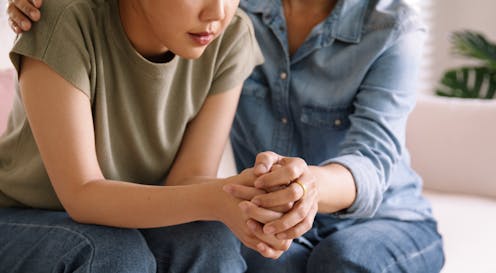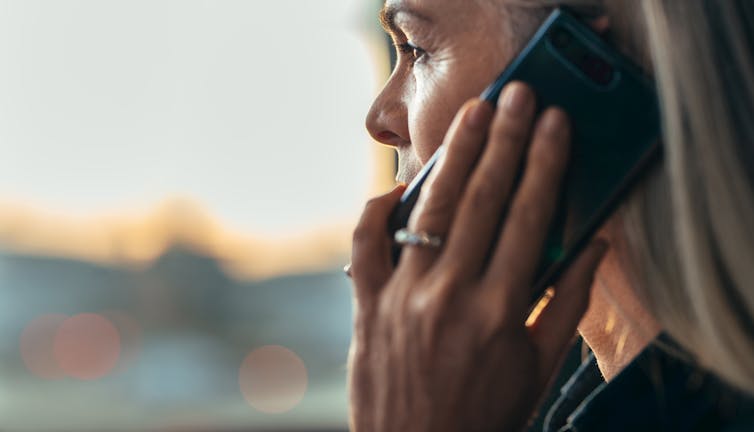
It is likely that you know someone in a harmful or unhealthy relationship. Domestic abuse is common. For example, estimates suggest that one in three women globally will experience abuse in their lifetime. But many people do not know how to respond when a friend, relative or colleague tells them about domestic abuse.
My new research with colleagues at UCL and domestic abuse charities examines how education and training can help families and social networks recognise domestic abuse, know how to respond and be willing to do so.
During COVID lockdowns, domestic abuse became more prevalent while traditional care services were more difficult to access. This meant that victims leaned on support from friends, family, colleagues and neighbours even more. As we found, equipping social and family networks to give this help can be a valuable – and lifesaving – addition to the support provided by professionals.
In the UK, charities and other social organisations offer training programmes, such as Women’s Aid “Ask Me”, programmes for faith leaders and toolkits for workplaces. These initiatives teach members of the public and community leaders how to respond to people experiencing abuse in positive and helpful ways.
While most people experiencing abuse tell at least one friend or family member, evidence suggests that female and young victims, and members of some marginalised groups are most likely to inform and rely on their informal networks rather than formal services such as the police.
The reaction of informal networks can be vital. Research shows positive reactions from friends or colleagues can improve the health, wellbeing and safety of people experiencing abuse. Informal support from personal contacts can also encourage people to seek help from formal services, such as gaining access to practical or legal support.
How to help
If you believe that a friend, relative, colleague or neighbour may be in a harmful relationship, it is not your responsibility to stop the abuse. If you think that they are in immediate danger, call 999 and ask for the police. But you can provide support and offer to help in other ways.
Talking about domestic abuse is difficult. It may make you feel uncomfortable if someone confides in you about an unhealthy relationship, or if you raise the issue of abuse. But there are steps you can take to respond in positive and helpful ways.
An easy way to remember them is through four “Rs”: recognise, respond, reassure and react.
Recognise
Our research highlights the importance of being able to identify the warning signs and risk factors for abuse. Many people do not recognise that domestic abuse takes many different forms. And there are widespread myths associated with abuse that must be challenged – for example, that it always involves violence.
Become familiar with domestic abuse in all its forms, including coercive control and economic abuse, so that you can recognise the signs of an unhealthy relationship.
Research suggests that learning about the high prevalence and serious impacts of domestic abuse also motivates friends, family, colleagues and neighbours to take action.
If you are planning on reaching out to someone close to you, domestic abuse charity SafeLives recommends you start by considering safety – theirs and your own. Think about safe ways to contact them or places to meet before you reach out.
Respond
When discussing harmful relationships or experiences of abuse, listen without blaming. Create a space in which your friend, relative or neighbour can confide in you and feel safe. Listen without judgement and show empathy. Be patient and recognise that it is not easy to talk about experiences of abuse.
Gender norms and cultural expectations might make it particularly difficult for some people to open up about their experiences, for example male victims of abuse or those in conservative religious communities.
Read more: How to be a good listener - and how to know when you're doing it right
Supporting a friend may mean reminding them that you are there to listen, helping them to identify their options, or seeking professional advice on their behalf (with their consent).
Reassure
Research highlights the importance of affirming, validating and understanding the feelings and experiences expressed by the person experiencing abuse.
Studies report that informal networks do not always respond in a helpful way. Expressing doubt, blame or hostility can harm the wellbeing of the person experiencing abuse and diminish the likelihood that they will seek further help. Make it clear that you believe them and validate their experiences.

Domestic abuse campaign group and charity Refuge provides advice on how to support a survivor and Equation, another group working against domestic abuse, recommends things that you should tell the person you are supporting. A good place to start is to say “I believe you”, and tell them the abuse “is not your fault”.
React
Finally, offer to help your friend, relative or neighbour seek support – acting only if and when they want you to. This may mean offering to get in touch with local support services, ringing the national domestic abuse helpline or using the webchat.
Women’s Aid also keeps an up-to-date directory of local support services and resources across the UK.
Research highlights that supporting a friend or family member experiencing domestic abuse is difficult, so take steps to look after yourself too. Stay aware of your own needs when helping someone with such a difficult situation, and incorporate activities into your routine that nourish your mental, emotional and physical wellbeing. This may include talking to friends, being compassionate with yourself, and making time for leisure activities.
Karen Schucan Bird receives funding from Economic and Social Research Council.
This article was originally published on The Conversation. Read the original article.







